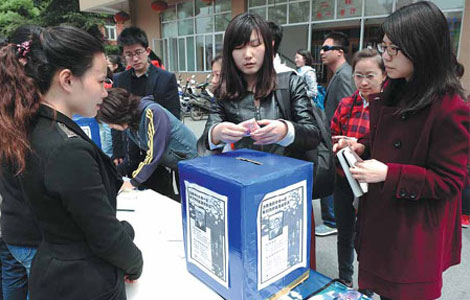Efforts 'needed to ensure wider use of renminbi'
Updated: 2013-05-03 00:58
By CECILY LIU in London (China Daily)
|
|||||||||||
|
 |
|
A shop in the Niagara Falls area in Canada accepts UnionPay cards for payment. China is pushing for renminbi internalization and encourages wider use of the yuan in international trade and currency reserves. ZOU ZHENG / XINHUA |
China should build the infrastructure for renminbi internationalization as the currency becomes increasingly used by overseas investors, according to Liu Mingkang, former chairman of the China Banking Regulatory Commission.
"Many countries have picked up the renminbi as a reserve currency. If we are to (act responsibly) for such a move, we have to quicken domestic financial-sector reform," Liu told a Cass Business School alumni event in London.
Liu identified reform of China's financial sector, including interest rate and exchange rate liberalization, as a key precondition to renminbi internationalization.
"We must make sure several ministries can work hand in hand to produce the yield curve (for renminbi pricing) to the market smoothly. To do that, you have to make sure the market will develop in a healthy way," he said, adding that China should also increase transparency of financial market regulation.
Liu said the Chinese mainland must shift from being export-driven to become increasingly reliant on domestic consumption, to avoid hot-money inflows once its currency market opens up.
"To do this, China must produce more good-quality goods to drive up consumption. When I was in Hong Kong, I saw mainland people lining up outside supermarkets buying everything, including soy source," Liu said.
China's push to internationalize its currency started in 2008, when the global financial crisis highlighted the danger of over-reliance on the US dollar.
Beijing soon began to encourage use of its currency in international trade, swap arrangements among central banks, and bank deposits and bond issuances in Hong Kong.
Measures by China to liberalize capital account controls have led to international speculation that the renminbi will become a reserve currency alongside the US dollar and euro once it becomes fully convertible. But Liu said China has no intention to push toward that goal.
"There is no reason why China should let the renminbi become a reserve currency. We have allowed the renminbi to develop offshore because we have a lot of offshore trade and investment, both inward and outward. If (foreign investors or central banks) want to pick up the renminbi as an investment vehicle or as a currency reserve, that's up to them," he added.
What China can do is to ensure the necessary mechanisms are in place to make the renminbi a safe and stable currency to invest in, and that internationalization of the currency does not adversely affect China's economy, Liu said.
Related Stories
Renminbi's role set to grow 2013-04-12 08:24
Australian dollar, renminbi to trade directly 2013-04-08 16:05
More policies to support cross-border use of renminbi 2013-03-02 09:56
More European firms favor renminbi for transactions 2012-10-24 09:40
Renminbi's global use growing 2012-04-21 13:23
Today's Top News
Renewed interest in mission to Mars
Suspects accused of selling tainted pork
Xi pins hope on youth for innovation, advancement
China playing bigger role in Middle East
FM wraps up tour on
note of stability
Museum window vandalized
Seawater can save thirsty country
New markets buy big at trade fair
Hot Topics
Lunar probe , China growth forecasts, Emission rules get tougher, China seen through 'colored lens', International board,
Editor's Picks

|

|

|

|

|

|





